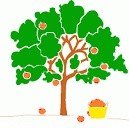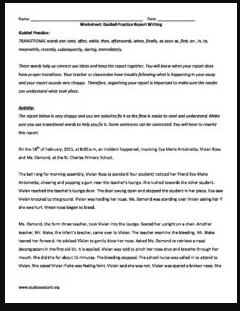Transitional words are words that help to join sentences together or connect ideas. They are preceded by a semi-colon and followed by a comma.
Examples of transitional words:
first, lastly, finally, next, however, besides, otherwise, as a result, however, therefore, indeed, hence, consequently, in fact, nevertheless, eventually, while, meanwhile…

Let’s see them in an example:
Bruce, in his impatience, thought the morning would never be over; consequently, he entertained himself. He played such pranks—exploding water balloons, pasting peanut butter in his baby brother’s diapers, and finally breaking his grandmother’s spectacles. Before his aunt and cousin arrived; indeed, almost immediately after lunch, he was sent to his room in disgrace.
Poor Bruce! There he lay in bed, rolling and kicking, while his older siblings, Julia and James, and cousin Anita were busy playing in the orchard. James was up in a tree, gathering and shaking, while Anita and Julia were standing below, catching the ripe oranges in their flowing skirts. Every now and then they would pickup the ones they missed from the ground and then pile them into the wicker basket. Later, the children peeled and ate the nicest and ripest, while Frisk was barking happily among them, as if he was catching oranges too!
ADDITIONAL:
Transition Words:
- To show order or time frame – after, before, finally, during, following, initially, later, meanwhile, previously, soon, since.
- To give examples – evidence of this, for example, for instance, in particular, in this case, such as
- To compare – as, compared to, like, in comparison, similar to, similarly
- To emphasize – always, especially, in fact, never, surprisingly, without a doubt
- To add information – additionally, along with this, also, for instance, furthermore, as well, in addition
- To contrast – although, but, on the other hand, in spite of, whereas, yet, in contrast, except
- To conclude – lastly, therefore, in summary, finally, as a result, to sum up, thus
- To indicate a cause or reason – as a result, due to, since, with this in mind, because, because of.
Here is an exercise to help you develop this skill. Click on the link below.
You must ensure your paragraphs link the previous paragraph with the next paragraph. You can do this in the following ways:
Use First, Second, Third; or use First, Then, Next, Finally
First, Mary sat down to write a charming letter to her sister in Barbados. It turned out to be a collection of remarkable stories about her adventures trekking from Europe to North Africa. The sheets were arranged and titled after each country Mary visited: Germany, Switzerland, Italy, France, Spain, Portugal, and Morocco. She really wished her sister was with her, but Jody was still in school. Mary folded the thick sheets, place them in the brown envelop along with a souvenir she had purchased earlier, and sealed it.
Then, Mary ask the porter at the Fes Inn to help her deliver a valuable letter. The porter was a tall, thin man in his fifties. He was indeed helpful and soon Mary was free to start another adventure. She clutched her camera, prepared to take pictures of the coastal region of Morocco. “Some more photos for my little sister.”
Use a Short connecting sentence
The monkey is a very cunning little animal. It is found in many parts of the world. Sheila once had a monkey, which had been brought to her as a present. He was a capuchin monkey named Marcel. This monkey, like all others, was very fond of mischief and of doing whatever he saw others do.
One time, Marcel watch his mistress for a week. She then found him one day sitting at the bathroom sink. He held in one hand a little china mug with water in it, and in the other her toothbrush, with which he was cleaning his tiny teeth, looking all the time in the glass. His mistress was furious.
Mildly refer to the main point in the previous paragraph.
The cunning animal managed to escape his owners grasp. Marcel hid from Sheila for another week, until he was certain she had cooled down. He was soon back to his mischievous ways. Her little daughter, Maria, had a large doll with a very handsome head and face. She one day left this doll in the cradle, and went out of the room. The monkey came in, took the doll in his arms, and jumping upon the washstand, he began to wash its face.
He first rubbed his face all over with soap. Then seizing the towel, he dipped it in the wash bowl, and rubbed it so hard that the doll’s face was entirely spoiled, the paint being all washed off. When Maria returned to the room and found the doll missing. She ran from room to room and soon come upon Marcel and the precious doll. The little girl was devastated. All this happen the first year Marcel lived with the Reeves family..
Organize incidents in chronological order.
By the second year, the Reeves had no choice but to give the monkey away. Marcel now lived with two travelling brothers, Luke and Matt, who earned their living entertaining pedestrians in the town. During one of their exhibitions, a dog flew at the little monkey, which made his new owners very angry. They and the owner of the dog quarreled about it, and at last it was agreed that the dog and the monkey should fight it out. Marcel, because he was smaller, was to be allowed a stick.
So, Marcel was taught to use a stick. He was taught in the following manner: One of the brothers crawled on his hands and knees, barking like a dog, while the other got on his back, grasped his hair, and beat him about the head with a stick. Marcel looked on with great gravity, and, when the instruction was over, received the stick with the air of a man who knew his work and meant to do it.
Marcel was ready to use his stick. Once everything was settled, the dog flew at Marcel with open month. The monkey immediately leaped on his back, and, grasping the dog’s ear, beat away at his head with such good will that his adversary speedily gave in. The monkey was victorious. However , the brothers, Luke and Matt, knew they should never have entertain such an idea. For they had to be careful what they taught their cunning little pet monkey.
Keep practicing! Make use of these ideas in your writing.
Click here for more worksheets
Note: Most examples are abstracts from short stories you can find on this website.





